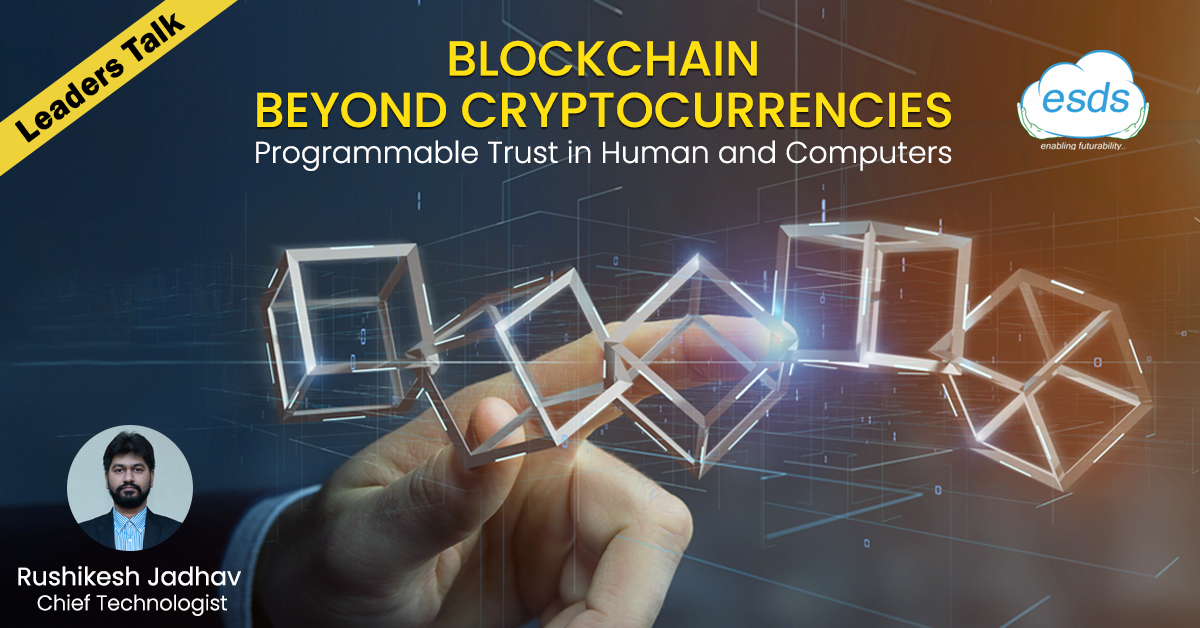Blockchain Beyond Cryptocurrencies – Programmable Trust in Human and Computers
Introduction
From startups to larger conglomerates, everyone has invested time and energy to leverage Blockchain in their respective field. Some have successfully implemented, while others acquired knowledge about its limitations and henceforth, decided to abandon it. This article looks at how Blockchain has evolved way beyond cryptocurrencies and how computers & humans are trusted each other in a programmable manner.

Centralization
I’m sure you are aware of cloud computing, a technology where you use someone else’s computer to process or store data. In most cases, you know the company where you are storing data, and you know that they have equal control of your data. If you store data with them for free, they process it for you unless you are paying for the storage, and the company is not into selling advertisements. Dwelling into it further, when you know your data is on a known remote company’s computer, the company decides your data placement, retention, processing, and creating knowledge from it. This is called Centralization, wherein one or a known group of companies are in possession and control of your data. This central company decides if they wish to block your access to your data or censor it. E.g., Social media platforms or Banks, or Cloud Service Provider. They may deny access or censor data citing fair usage policy or the law of the land.
Decentralization
Unlike Centralization, you can store data on a lot of geographically distributed computers without having to worry about a single company censoring it or denying you access to it. You can not only store data but can also introduce processing power on it. In some scenarios, the process is already predefined or can be defined by you – the user. In a decentralized way of computing, users can chunk, encrypt, replicate data and store it on remote computers such as it becomes highly available and stays confidential. In a Decentralized world, the platform is unaware of data, and the user holds 100% responsibility for the data generated by him/her. The platform never censors data as it never reads (police) it.
Blockchain Role
With Blockchain, trust in the data is created by introducing immutability, tamperproof, and history awareness. Unlike Encrypted data, users use Blockchain to store open access data. Because of the properties that Blockchain carries, the data’s authenticity can be easily validated, and ownership of the data can be established. Imagine storing Art on a public website so that users can show ownership and authenticity without worrying about it getting copied. Such arts can be easily verified to their original author in a decentralized way, protecting users’ interest.
Use Cases
With such a decentralized approach, users can choose to create & store open information on these blockchains. Information on organizations such as NGO, Whistleblower, Trust funds, Govt income, and spending, Arts, etc. This information can be extracted by various 3rd party organizations to create knowledge. Such 3rd parties can be charged for data access while the revenue is shared between data storing parties and data owners.
Another surge of use cases is based on immutable data. Immutability means that no one (including data owner) can modify it once the data is stored on Blockchain. These blockchains are also referred to as append-only blockchains and due to their nature, they are highly valued for storing ledger transactions or recording money movement.
Pay per transaction models are another popular use case. Imagine going to a restaurant that serves liquor and admits only adults. At entry, you are asked to verify your age, and you want to do it without disclosing any identifying information or submitting your Aadhar card. A blockchain-powered application can help in this case. The restaurant can send (broadcast) your digitally signed message and query any local or remote blockchain, confirming that the person who signed the message is above 18years old. All of this is in an automated trusted way where you get admission to the restaurant without disclosing who you are or how old.
Such privacy-oriented use cases are less in existence; hence people tend to submit all information instead of just the required information. This could lead to a serious breach of trust or potentially damage finance; however, the lack of these privacy-oriented implementations continues to be pushed by the data collectors.
Conclusion
Although it’s the Cryptocurrencies that made Blockchain a famous tech, there are way more use cases beyond tracking virtual money movement. Use cases that can strengthen user online privacy and let them interact in the real-world safely.
- What is the Difference Between Horizontal & Vertical Scaling? - March 26, 2021
- Blockchain Beyond Cryptocurrencies – Programmable Trust in Human and Computers - November 10, 2020
- CryptoCurrency – A Trust-less Exchange of Value - March 6, 2018

Awesome article post.Much thanks again.